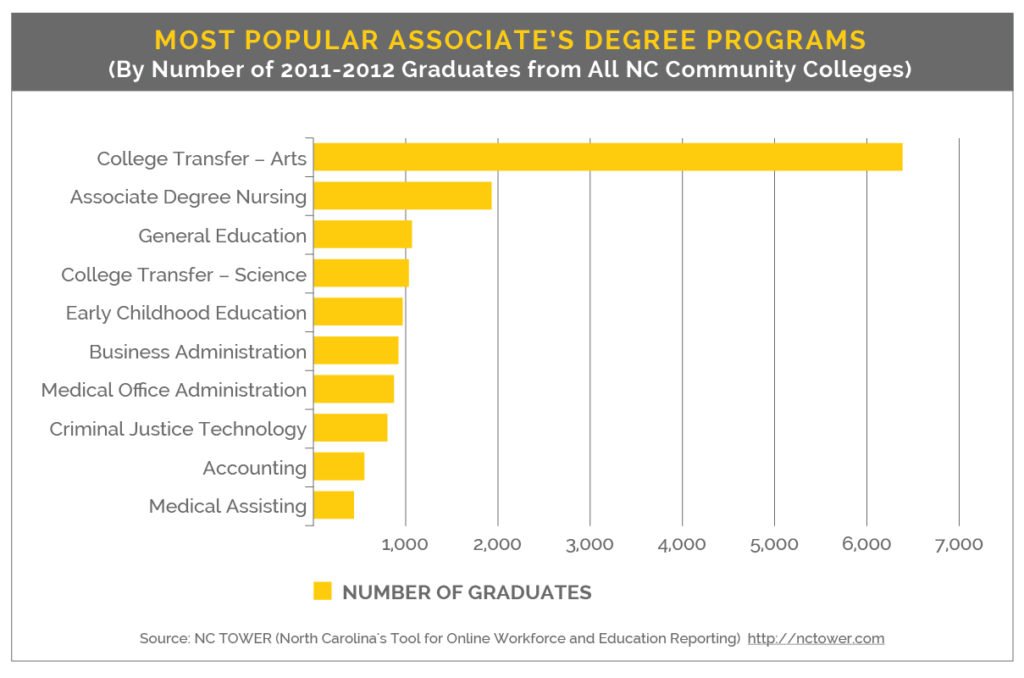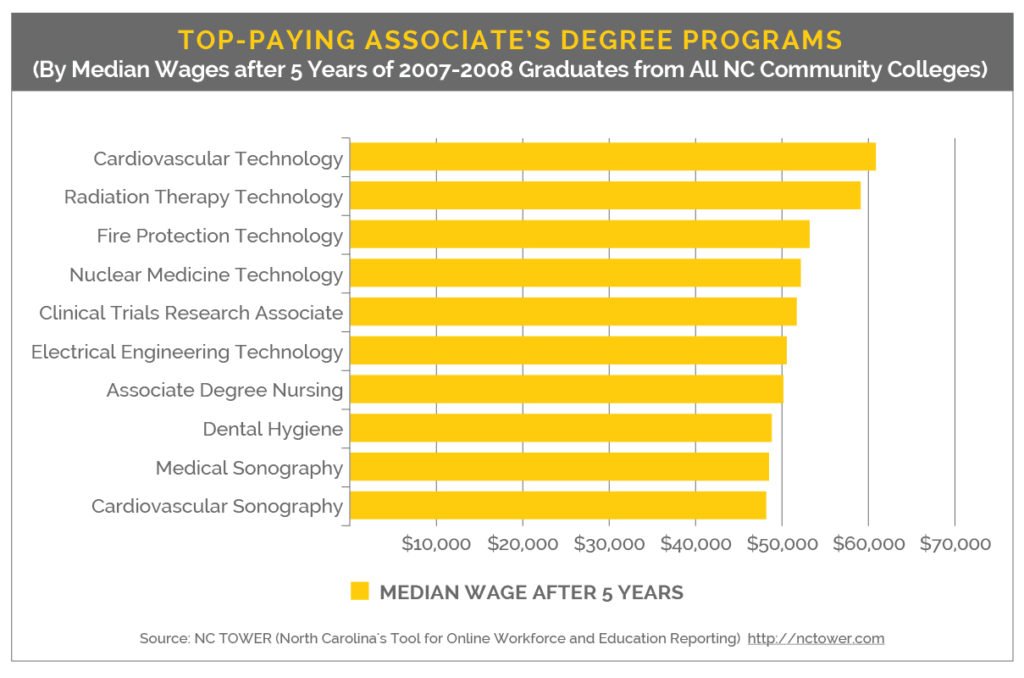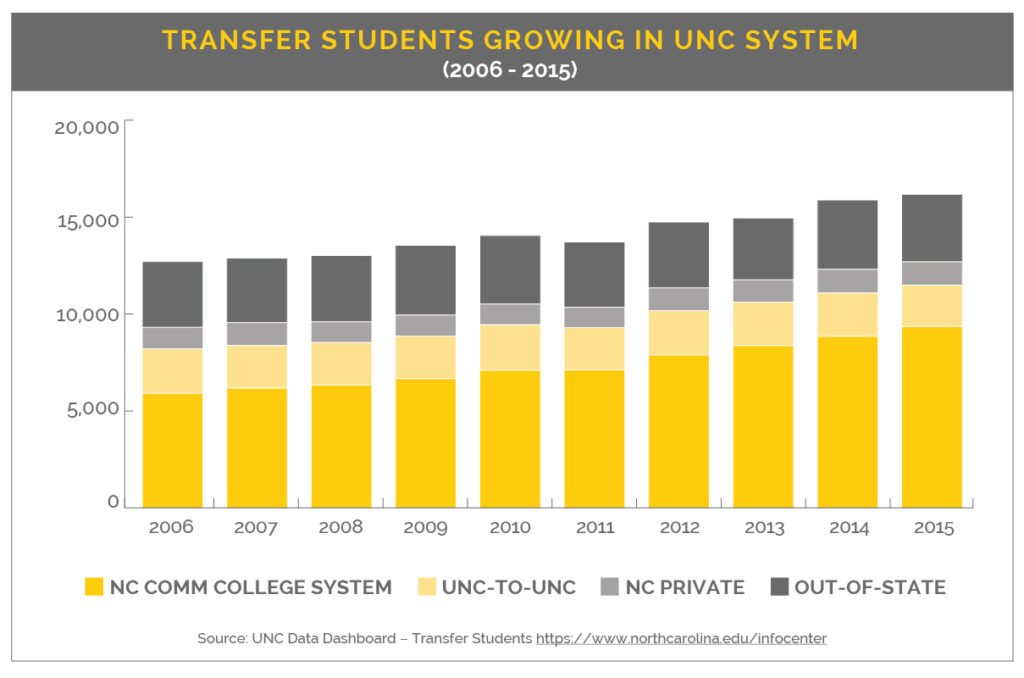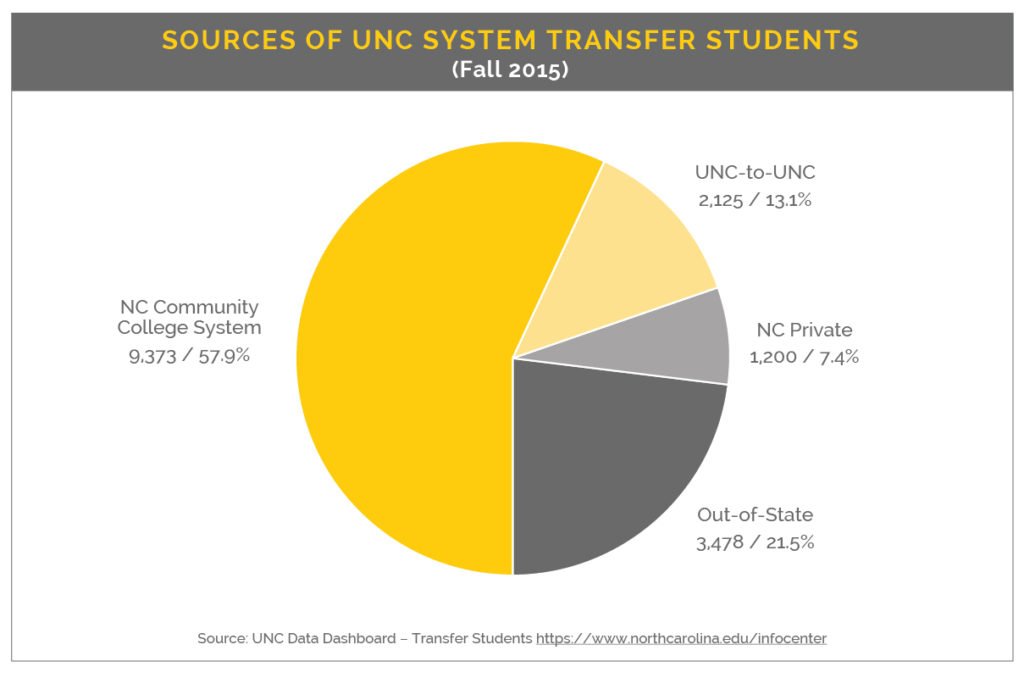RALEIGH – They’re the Swiss Army knife of higher ed: Whether it’s preparing students to attend a four-year institution, training for a trade or training customized for a local employer, community colleges prepare students for many, many different tasks.
In an era of rising university tuition and shifting skill demands from employers, they have become so crucial that an increasing number of states – most notably Tennessee – are making them free.
With 65% of U.S. jobs projected to require post-secondary education and training by 20201 and employers already citing a shortage of qualified applicants, there’s no question community colleges are a critical part of the equation.
Some 40% of North Carolina workers attended a state community college in the past 10 years.2 The 58 colleges offer everything from high-school equivalency instruction to developmental courses, associate’s degrees, courses that count toward a four-year degree, industry-specific training, continuing education and retraining of an existing workforce.
“In the business world, you would call one-stop shopping ‘vertical integration.’ And we have vertical integration in workforce development,” says President Jimmie Williamson of the NC Community College System.
“It’s a business solution for an industry or a business, and there are a lot of moving parts.”
For students in high-demand construction trades, said Williamson, “They get a skill and then they get a job – and often they don’t stay long enough to get an associate’s degree or a credential.”
To be sure, there aren’t many unemployed welders, electricians, plumbers or truck drivers these days.
Similarly, the University of North Carolina System is seeking to open pathways for more rural, first-generation, low-income, military and adult students who need flexible choices. For many of those students, community college is a critical step.
“In a complex and highly competitive knowledge economy, we must help more North Carolinians — particularly first-generation, low-income, and rural students who have historically lagged in college attainment — to achieve at much higher levels. That means thinking more creatively about how we reach new students and deliver a quality education that fits their needs,” the University’s strategic plan says.3
That includes “providing multiple access points into the University such as pathways for transfer students and availability of online courses.”4
North Carolina’s community colleges – many in more convenient local settings than state universities – are key to those efforts. After repeated tuition increases at universities, growing numbers of students see community college as a more affordable place to start.
As the state weathered the Great Recession, the number of community-college transfer students grew from 5,931 in 2006 to 9,373 in Fall 2015.
Former community-college students now account for 57.9% of transfer students in the UNC System.5
Those students appear well-prepared: 74% who attend a UNC System school after receiving an associate degree from the NC Community College System graduate within four years.6
While funding for community colleges is down in many states, others have aggressively promoted community college. Oregon made it free for in-state students in 2015, and Arkansas and Kentucky are preparing similar efforts.
But our neighbors in Tennessee have been the leader.
This year the state expanded its free community-college program from accepting only high school graduates to accepting all adults. The program is popular: More than 33,000 students have taken advantage of Tennessee Promise, increasing first-year enrollment at community colleges by 30%.
“It has completely changed the conversation at the dinner table,” Tristan Denley, vice chancellor for academic affairs at the Tennessee Board of Regents, told Time. “Five years ago, students might ask Mom and Dad, ‘Can I go to college?’ Now it’s ‘Where should I go to college?’”7
In North Carolina, Richmond,8 Sandhills,9 Montgomery,10 Brunswick11 and Isothermal12 community colleges have all begun to offer free tuition to graduates of local high schools.
Could there be more?
“We support anything that would promote access and affordability for any North Carolinian,” said Williamson.
1https://cew.georgetown.edu/wp-content/uploads/2014/11/Recovery2020.ES_.Web_.pdf.
2http://www.nccommunitycolleges.edu/get-facts
3Ibid, p. 5.
4Ibid, p. 7.
5https://ung4.ondemand.sas.com/SASVisualAnalyticsViewer/guest.jsp?appSwitcherDisabled=true&reportViewOnly=true&reportPath=/UNG/External+Content/Reports&reportName=transfer_enrollment_report.
6BEST NC Facts & Figures 2017, p. 71; UNC System 2015 Retention and Graduation Report.
7http://time.com/4800811/the-case-for-community-college/.
8http://richmondcc.edu/about-us/news/rcc-rolls-out-plan-free-college-tuition-board-meeting.
9http://olympus.sandhills.edu/apps/news/view.php?id=610.
10https://www.montgomery.edu/foundation/906-foundation-scholarships#montgomery-scholars.
11http://www.brunswickcc.edu/bcc-provide-free-tuition-fees/.
12https://www.isothermal.edu/powers/index.html.





Marty P. Gibson says
There you go again. Telling us free tuition is free. Sounds kinda like Bernie Sanders pablum. And of course this “free tuition” doesn’t have any kind of tax increases on the citizens who will be tagged to support this “free tuition”? Now don’t get me wrong on this issue. I attended a community college before transferring to a NC university back in the day. Seems like the cost of tuition wasn’t excessive. I was using the my dad’s GI Bill so I guess I was getting free taxpayer supported tuition. Of course in order to do that my dad had to have died while he was in the service. But hey what the heck! It was free. I did, however, give 20 years 11 months and 7 days the US Navy to help pay back that loan later. So, I’ve never bought into the socialist concept that something is “free”. There is a cost in there somewhere. You will call it a tax or maybe a “fee” (another three letter word) because you will have to make up for the loss of revenue from the tuition somewhere. So, it maybe free to some but what about those of us who paid? Maybe we can start talking about rebates for those of us who somehow paid their way through. I’m sure my wife and my son would appreciate getting their investment back. I did pay for my Master’s degree and all subsequent tuition and fees associated with furthering my education after that first free round.